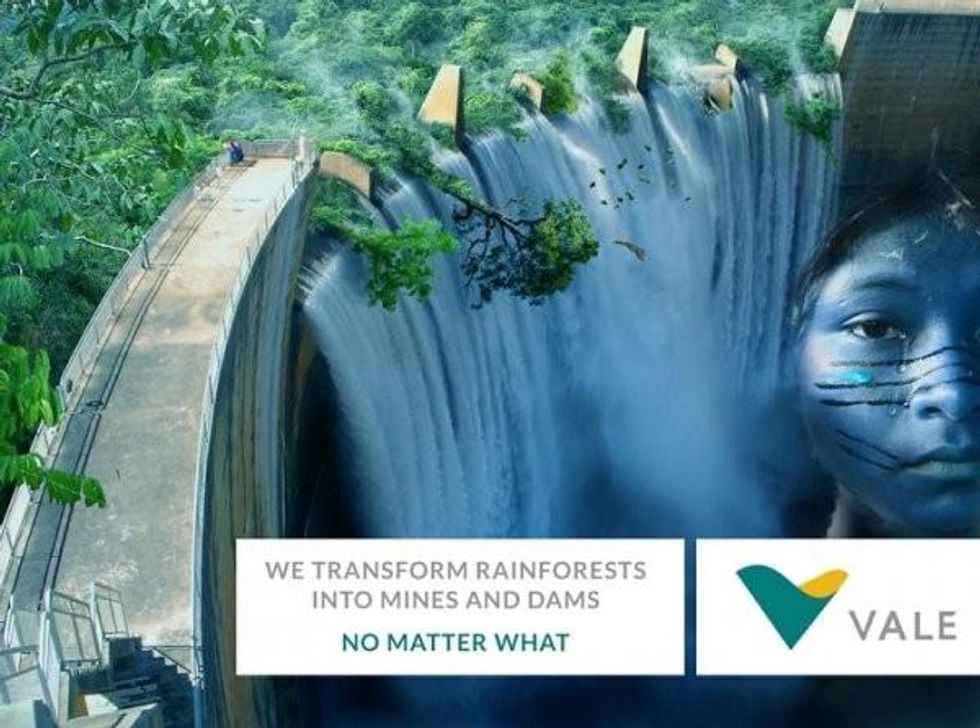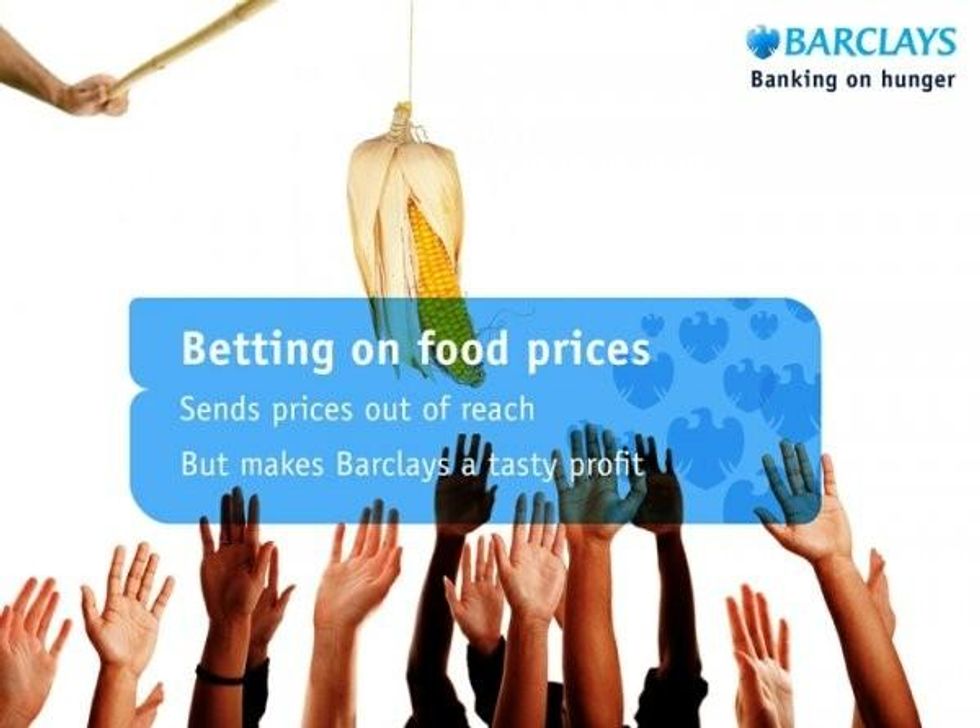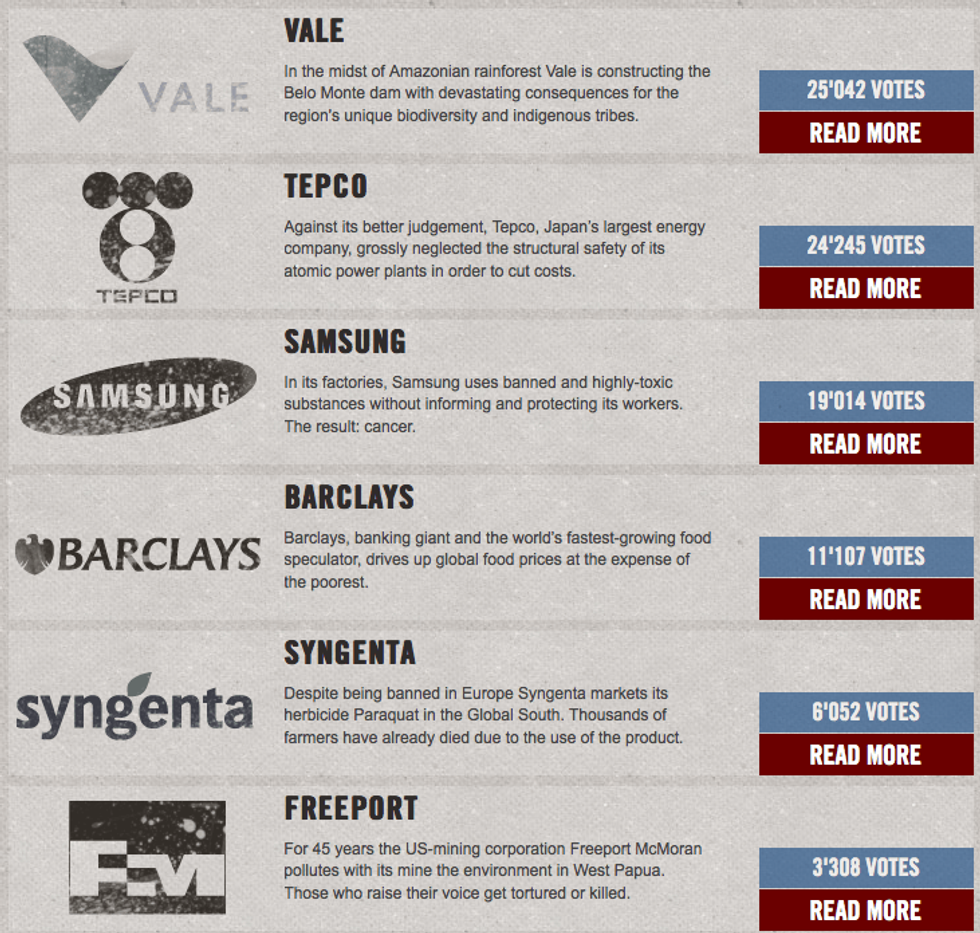Brazilian mining giant Vale and UK-based Barclays bank were given the dubious honor of being the top vote-getters in this year's survey asking participants to name the world's most destructive international corporations. The results of the survey are gathered by The Public Eye, an effort organized jointly by the Berne Declaration and Greenpeace Switzerland, and announced annually at an awards ceremony held during the World Economic Forums's gathering in the Swiss town of Davos.
The purpose of the awards, according to the The Public Eye website, are to highlight "the particularly flagrant human rights abuses and environmental harm by corporations."
The deregulation of world markets has greatly expanded the range of transnational corporations. This change has come about at such a rapid pace that national laws have long lost their ability to impose an orderly framework. The voluntary restraint or social/environmental commitment pledged by companies is often not worth the glossy paper it is printed on. Patents that price life-saving drugs out of reach of poor populations, natural resources exploited without regard for the local environment, or workers exploited ruthlessly in a race to the bottom, you name it - there is nothing that the global players assembled in Davos will not do to improve their bottom line. It is more important than ever to remind corporations of their social and environmental responsibility. We want a legal framework that will hold them accountable for their practices.
The People's Award, based on a popular vote, was awarded to Vale mining. According to background:
Vale has a long corporate history characterized by inhumane working conditions, human rights violations and environmental destruction. Currently, Vale is a significant partner in the NESA consortium that is building the highly-controversial Belo Monte Dam in the heart of the Amazon. The USD 17 billion project is characterized by authoritarian planning and blatant disregard for human rights and environmental legislation. Affected indigenous peoples have not been consulted in the planning process. Clearly, Vale is participating in the dam project in order to ensure a cheap energy supply for its existing and planned mining operations in the Amazon.
And Barclays, which won the jury prize chosen by members of Greenpeace and the Berne Declaration, was singled out for its role in profiting from commodity trading and "effectively betting on hunger by speculating on food prices."
The investment banking section of the UK-based giant, Barclays, has been the fastest growing food speculator in Europe - and arguably, worldwide. In the second half of 2010 alone, 44 million people were driven into extreme poverty due to rising food prices. Women, children and elderly people in the global south are often the hardest hit when families struggle to afford food. New European regulations could end the scandal of food speculation, but the UK government and its close allies in the financial sector, such as Barclays, are threatening to block effective rules.
The other winners:
And The Guardianreports on comments made by Nobel prize winning economist, Joseph Stiglitz, and others at the award ceremony:
"There is no longer any credibility - if there ever was - to the interpretation of Adam Smith's ideas that suggests firms' pursuit of self-interest leads, as if by an invisible hand, to the well-being of society," he said. "With these nominations, some of the worst examples of corporate irresponsibility in the last year have been identified."
Francois Meienberg, co-founder of The Berne Declaration, cited a lack of transparency in business as a major problem.
"The main criticism was here in Davos, big companies are meeting with governments behind closed doors, and nobody knows what is happening," he told the Guardian. "For us it was always important to show the other side, in some cases the victims of these companies have a voice up here."
Meienberg cites a food security event he attended in Davos yesterday as an example. "Unilever was there, Bill Gates was there, but there was no farmer," he says.
While shaming corporations into better behaviour is part of what the awards are about, Meienberg also looks at the bigger picture. "It can't be the goal in itself to blame these companies every year. We try to show that there is a lack of regulation of these kinds of companies," he said.
###



